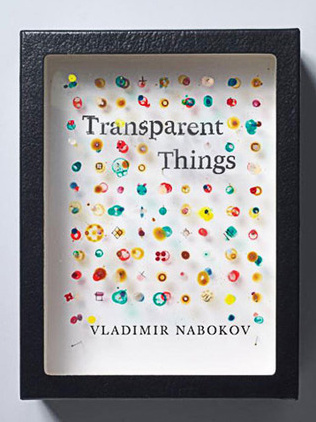

“Perhaps if the future existed, concretely and individually, as something that could be discerned by a better brain, the past would not be so seductive: its demands would be balanced by those of the future.”
― Vladimir Nabokov, quote from Transparent Things
“This is, I believe, it: not the crude anguish of physical death but the incomparable pangs of the mysterious mental maneuver needed to pass from one state of being to another.”
― Vladimir Nabokov, quote from Transparent Things
“Easy, you know, does it, son.”
― Vladimir Nabokov, quote from Transparent Things
“ 'I shall vomit,' said Hugh, 'if you persist in pestering me with all that odious rot.' ”
― Vladimir Nabokov, quote from Transparent Things
“Mas o amor, dizia ele, era tudo menos credível, a vida real era ridícula, os labregos riam-se do amor.”
― Vladimir Nabokov, quote from Transparent Things

“According to my almond-eyed little spy, the great surgeon, may his own liver rot, lied to me when he declared yesterday with a deathhead's grin that the operazione had been perfetta. Well, it had been so in the sense Euler called zero the perfect number. Actually, they ripped me open, cast one horrified look at my decayed fegato, and without touching it sewed me up again.”
― Vladimir Nabokov, quote from Transparent Things
“Direct interference in a person's life does not enter our scope of activity, nor, on the other, tralatitiously speaking, hand, is his destiny a chain of predeterminate links: some "future" events may be likelier than others, O.K., but all are chimeric, and every cause-and-effect sequence is always a hit-and-miss affair, even if the lunette has actually closed around your neck, and the cretinous crowd holds its breath.”
― Vladimir Nabokov, quote from Transparent Things
“He loved her in spite of her unlovableness. Armande had many trying, though not necessarily rare, traits, all of which he accepted as absurd clues in a clever puzzle.”
― Vladimir Nabokov, quote from Transparent Things
“and he, Hugh Person....began to undress her in the motels of his mind”
― Vladimir Nabokov, quote from Transparent Things
“Eis a pessoa que eu quero. Olá, pessoa! Não me ouve.”
― Vladimir Nabokov, quote from Transparent Things

“You'll call, and text, and time will fly by. You guys are solid, remember? Made to last.”
― Abby McDonald, quote from Getting Over Garrett Delaney
“-'tis an old observation, and a very true one; but what's to be done, as I said before? how will you prevent people from talking?...”
― Richard Brinsley Sheridan, quote from The School for Scandal
“It is quite ironic that those calling the loudest for 'morality' are typically the most immoral of all.”
― Christina Engela, quote from Demonspawn
“Godly fear,” wrote John Bunyan, flows from a sense of the love and kindness of God to the soul. Where there is no sense of hope of the kindness and mercy of God by Jesus Christ, there can be none of this fear, but rather wrath and despair, which produces a fear that is … devilish; … but godly fear flows from a sense of hope of mercy from God by Jesus Christ.2”
― Jerry Bridges, quote from The Joy of Fearing God
“You’re not exactly up for the Humanitarian of the Year award, so save your altruism for someone who can't see through you like cellophane.”
― Rebecca McNutt, quote from Mandy and Alecto: The Collected Smog City Book Series
BookQuoters is a community of passionate readers who enjoy sharing the most meaningful, memorable and interesting quotes from great books. As the world communicates more and more via texts, memes and sound bytes, short but profound quotes from books have become more relevant and important. For some of us a quote becomes a mantra, a goal or a philosophy by which we live. For all of us, quotes are a great way to remember a book and to carry with us the author’s best ideas.
We thoughtfully gather quotes from our favorite books, both classic and current, and choose the ones that are most thought-provoking. Each quote represents a book that is interesting, well written and has potential to enhance the reader’s life. We also accept submissions from our visitors and will select the quotes we feel are most appealing to the BookQuoters community.
Founded in 2023, BookQuoters has quickly become a large and vibrant community of people who share an affinity for books. Books are seen by some as a throwback to a previous world; conversely, gleaning the main ideas of a book via a quote or a quick summary is typical of the Information Age but is a habit disdained by some diehard readers. We feel that we have the best of both worlds at BookQuoters; we read books cover-to-cover but offer you some of the highlights. We hope you’ll join us.